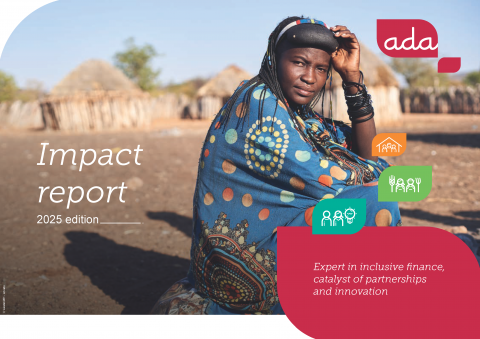
The impact of ADA’s activities on smallholder farmers

© Godong
ADA has released its first impact report based on impact analyses which assess how effectively ADA’s programmes improve the living conditions of vulnerable people between 2022 and 2024 while identifying areas for improvement. Smallholder farmers are one of the analysed groups of vulnerable people.
Smallholder farmers across Africa, Latin America and Asia face growing challenges from climate change. Droughts, unpredictable rainfall and rising temperatures threaten their productivity and livelihoods. However, these farmers often lack access to the financing they need to make their businesses more resilient as many financial institutions still view agriculture as too risky. This results in a lack of financial products that are tailored to the seasonal and long-term nature of farming activities.
To address these challenges, ADA works through local partners to provide tailored financial services that support every stage of the agricultural value chain from production and storage to processing and marketing. In addition to financing, ADA offers technical training and helps farmers access new markets. These combined services empower smallholders to manage and grow their businesses sustainably, increase their income and improve their living conditions.
Ensuring the long-term future of farming depends on helping farmers to adopt climate-resilient practices and to gain access to effective risk management tools such as insurance. By improving both financing opportunities and access to profitable markets, smallholder farmers can develop their business to secure and ideally increase their income.
Lessons learned and outlook
The impact report identifies the following lessons learned from ADA’s programmes that address the needs of smallholder farmers:
- The challenges faced by small producers are interconnected. Addressing one issue in isolation therefore often limits impact or leads to failure. For example, an increase in production will not result in an increase in income without improved access to markets. Effective solutions require coordination among multiple stakeholders, which can be complex to achieve within a single intervention. Instead, ADA has adopted a step-by-step approach to integrate additional components into selected programmes.
- The impact of climate change and natural resource degradation on productivity has emerged as a major concern for all smallholders and it influences the outcome of every intervention.
- Personalised and long-term support is essential to help smallholder farmers adopt sustainable and resilient practices in a lasting manner, which is costly, long-term, personalised support is essential to make production practices more sustainable and resilient in a lasting manner.
- There is still a lack of tailored financing mechanisms to facilitate the transition to more sustainable practices. Many financial institutions lack the understanding and knowledge needed to offer long-term financing for the agricultural sector which is still perceived as risky.
- Awareness-raising and financial education remain essential for both producers and financial institutions to encourage the use of insurance. Practical experience with insurance and linking it to more tangible services can help build trust and demonstrate its value.
Further information can be found in the impact report, which also analyses three of ADA’s interventions targeting smallholders in detail.
